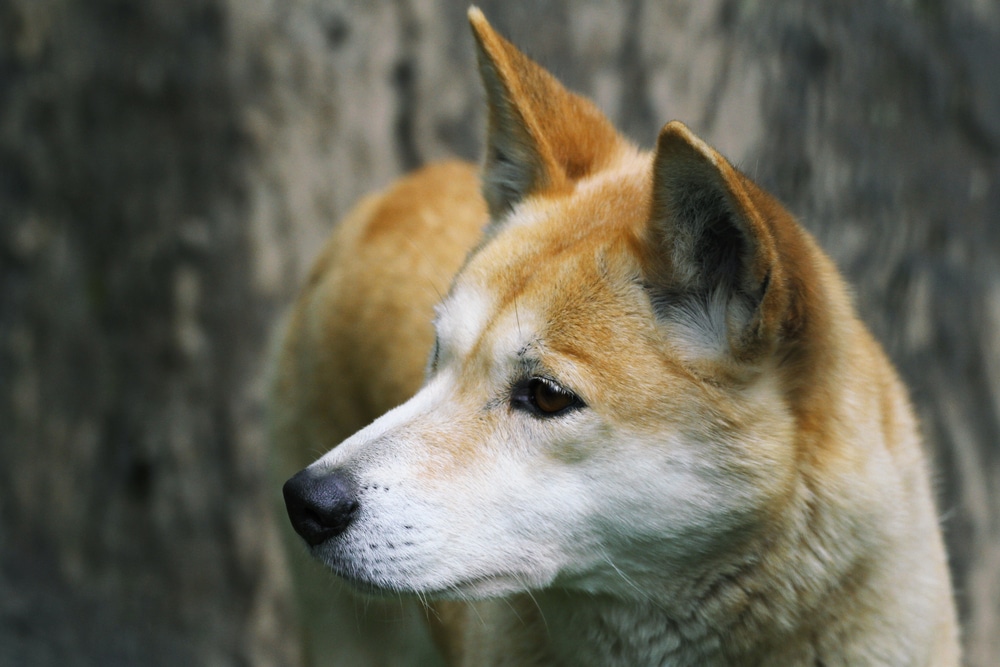Dogs can’t talk but communicate with us through barks, howls, and sometimes whimpers. A dog’s cry can mean many things, so interpreting it correctly can be tricky. So, if you’re wondering why your dogs whimper and what it means, take a look at the following reasons.
Dogs whimper for many reasons, including excitement, frustration, fear, anxiety, stress, pain, hunger, attention-seeking, or showing submissiveness. In many cases, boredom, cognitive decline, and medical complications also lead to whimpering behavior. If your dog is whimpering more than usual or you can’t figure out the reason behind it, it’s always best to consult with your veterinarian.
Table of Contents
What Is Whimpering?
Whimpering is a type of vocalization that dogs use to communicate. Puppies learn it from their mothers. Frequently, whimpering starts as a way to signal their human owners they need something, such as food. Your dog may also whine in other situations too, such as when they want a toy or your attention.
11 Reasons Why Dogs Whimper

A dog can whimper for many reasons, each dependent on the emotional state or needs of the dog. The following are 11 possibilities dogs whimper.
1. Whining To Get Attention
Dogs whine for a variety of reasons, but one main reason is they crave attention. There will be moments when your furry friend just needs some love and affection or at least a good scratch. Your dog may whine because it wants you to spend time with it too.
2. Asking For Something They Want
Dogs also whine when they’re trying to tell you they need something. It could be anything from food or water to a bathroom break.
If your dog whines for another walk immediately after you come back inside from one, this could also be a sign of a bladder or digestive issue. In this case, you should take it to the vet.
3. As A Sign Of Anxiety
Several things can cause a dog to whimper in anxiety. Maybe you’re leaving, and he’s experiencing separation anxiety, or there could be a change in its environment that’s causing your dog stress. The addition of a new pet can also be stressful for your dog.
When your dog’s routine is disrupted or he’s feeling overwhelmed, such as during a trip to the veterinarian, it may start whining more too.
4. To Show Excitement
Your dog may start to whimper when they see you coming home or know it’s time for a car ride or a walk. It is their way of showing excitement and anticipation. If your dog starts to whimper while you’re preparing their food, it means they’re excited about the food you will give them. Whimpering is also a sign of happiness and contentment in dogs.
5. Whimpering Due To Pain
Your dog may start to whimper in pain for a variety of reasons. They may have hurt themselves while playing, or they may be experiencing joint issues. However, whining can be due to something more serious, like surgery or a major injury. If you’re unsure of what is causing your dog’s pain, it’s best to consult a veterinarian.
6. To Show Frustration
Dogs express their frustration through whimpering when they’re left alone in the house while the family plays outside, when their favorite toy is inaccessible, or when they don’t enjoy being kenneled.
7. To Express Fear
If your dog is also panting, pacing, or trembling while whimpering, they are fearful about something. Various things can frighten dogs, such as new people or animals, a loud noise, or an inanimate object. Some dogs may also develop phobias that make them whimper at the mere thought of facing their fear head-on.
8. Whimpering Out Of Boredom
Your dog is whining, and you can’t figure out why. It’s possible your pup is simply bored and in need of physical & mental stimulation. Boredom often leads to destructive behaviors, so keeping your furry friend occupied is essential.
9. To Show Submissiveness
Sometimes, your dog might be whimpering to show submission, especially if it did something bad like eat your flowers or chew on your shoes. This behavior stems from their ancestors: wolves. If a wolf broke pack rules, it would get shunned and have to bow its head with its tail between its legs to be accepted back in. Our dogs display the same posture when they look guilty.
If your dog is whining to apologize, simply nod or say, “It’s okay,” and then walk away. It sends a signal it is forgiven.
10. Due To Cognitive Decline
Dogs may suffer from cognitive dysfunction as they age, which includes dementia and disorientation. Your dog may become suddenly lost indoors or forget where things are and express its confusion. Dogs may also start to show other signs of dementia, such as changes in sleep patterns, increased anxiety, and decreased interest in activities they used to enjoy.
11. In Response To A Medical Condition
When you’re feeling under the weather, it’s not uncommon to voice your complaints. Dogs are no different—if they’re experiencing allergies or a cold, they may sneeze and appear congested. Similarly, other illnesses can produce a wide range of symptoms.” By vocalizing its discomfort, your dog is essentially saying, ‘I don’t feel good.’
How To Stop Excessive Whimpering
Whimpering is a typical way for dogs to communicate. However, if it heightens or becomes excessive, there might be an underlying issue that needs addressing. There are a number of things you can do to stop your dog from whimpering excessively.
Boost Your Dog’s Confidence
Dogs that feel anxious or scared are more likely to whimper. One way to stop your dog from whimpering is to boost its confidence by:
- Enrolling your dog in an obedience class that uses reward-based training techniques.
- You and your furry friend can also try trick-training classes or doggie sports such as agility, flyball, and musical freestyle.
- Playing interactive games like tug and fetch with your pup is a great way to have some fun while strengthening your bond with each other.
Give Attention Or What Your Dog Wants
If your dog whines to gain attention, rewards, or desired objects, instead of rewarding bad behavior, wait until your dog is quiet and then give her attention and a reward. To show your dog that their attention-seeking whining won’t work, use dramatic body language like:
- Completely ignoring your dog
- Turn away from your dog
- Fold your arms across your chest
By Diverting Your Pup’s Attention
Dogs whine when they see people because they’re overexcited and may not have good behavior as a result. You can get their attention with toys and use management procedures to keep them less excited, like:
- Keep your greetings short and sweet.
- Avoid excited or loud tones and move slowly and calmly.
- Only pet & interact with your dog when they are calmer.
Eliminate The Cause Of Fear, Stress & Anxiety
To stop your dog’s excessive whimpering, identify and remove the source of their fear, stress, or anxiety, such as:
- If your dog is afraid of loud noises, try to keep them away from areas where they may hear loud sounds.
- If they are anxious around other people or animals, socialize them gradually.
Once the source of their distress is removed, you can begin working on training and desensitization exercises to help your dog overcome their fear.
Consult Your Vet To Fix The Medical Problem
Often, when a dog doesn’t stop whimpering, there may be an underlying medical condition. After consulting with your veterinarian and discussing your dog’s behavior, they may recommend tests – such as blood and urine tests or imaging techniques – to rule out any potential problems. The vet will provide appropriate treatment options if a medical issue is discovered.
Tips To Prevent Whimpering In Dogs
Here are a few tips to help prevent your dog from developing whimpering behavior.
Avoid Physical And Verbal Punishment
If you Intimidate your dog, it will only make them more submissive and increase their whining. Never punish or yell at your dog for whining, as this could make a scared or anxious dog become even more fearful and lead to aggression.
Don’t Fulfill Your Dog’s Desires Immediately
If you don’t want your dog to become a whiny adult, resist its “whining” now. Puppies are undeniably cute when they whine, but if you give in every time, your puppy will learn whining gets it what it wants. It is the most common cause of problem whining in dogs.
Regular Mental & Physical Activity
Canine whimpering is often the result of boredom. To help prevent your dog from whimpering, ensure to provide it with plenty of regular mental & physical activity. It can be in the form of walks, runs, fetches, agility training, and more. To keep your dog’s mind challenged and engaged, provide them with food-dispensing toys or puzzles.
Respond Selectively
Only respond to your dog’s whining if you’re positive there’s an actual need; otherwise, it is best to ignore the noise. Such as when your dog is whining to go outside to relieve itself, it’s best to ignore the behavior, otherwise, you risk reinforcing the whining behavior.
In Conclusion: Why Do Dogs Whimper?
Dogs whimper for various reasons, but most often, it’s because they want something and are trying to communicate with their owners. You’ll have a better relationship with your furry friend by understanding why dogs whine and what you can do to prevent or stop the behavior.
Do you have a dog that whines excessively? How do you manage the behavior? Let us know in the comments below!
